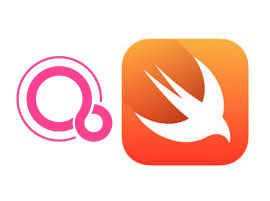| Google's Fuchsia OS And The Forking Of Swift |
| Written by Mike James | |||
| Tuesday, 21 November 2017 | |||
|
This more a "what is going on" sort of story than any prediction of the future. About a week ago the Google team developing the mysterious Fuchsia operating system forked Apple's Swift language. Now it seems that the fork was to add code that supported Fuchsia - but why?
I have to say that I have no idea why Google is working on yet another operating system. You might have thought that Android and Chrome, both Linux-based, would be enough. It is even difficult to see a gap that the new OS might be trying to fill. The idea that it could be a replacement for Android or Chrome is far fetched as there are far too many devices running both systems to see an opening for another. It is unlikely to be something needed for the IoT either as Google has Android Things even though Fuchsia has a real time kernel at its heart. The languages that Fuchsia favors are Dart, C/C++ and of course Go. Now it seems we can add Swift to the mix. Apple invented Swift as a replacement for Objective C used for iOS development. Google is stuck mostly with Java, and now Kotlin, for Android. Given the worries about Oracle's law suit over the use of Java you can see why Google might be looking for an alternative Android language but Kotlin is a much better match in this environment than Swift. To see the adoption of Swift as some sort of defence against Oracle would need you to believe that Fuchsia was an Android replacement which, as already commented seems unlikely to succeed. After creating the fork the Android team have now issued a pull request to have their modification incorporated into the official Swift repo. "Adds initial support for Fuchsia OS to the compiler and adds support for building for Fuchsia in the stdlib. This change also introduces lld linker support to the build system and fixes a number of issues related to cross compiling Swift to platforms that do not support universal binaries. As part of this change, non-Darwin libraries in the standard library are now stored in lib/swift/<platform>/<arch> instead of lib/swift/<platform>." Modifying a language to work with a particular operating system is a matter of changing the system calls for things like I/O and process management so there are unlikely to be any noticeable changes to the language as used by a programmer. What Apple might make of Google's involvement with "its" language we can only speculate, but it is safe to say that it isn't going to have much impact on Swift. Of course, I could be very wrong. What do you think Google is doing with Fuchsia, and Swift in particular?
More Informationhttps://fuchsia.googlesource.com/ Related ArticlesSwift 4 Improves String Handling Apple Launches Swift Playgrounds Top Languages 2015 - Stasis But For Go And Swift
To be informed about new articles on I Programmer, sign up for our weekly newsletter, subscribe to the RSS feed and follow us on Twitter, Facebook or Linkedin.
Comments
or email your comment to: comments@i-programmer.info |
|||
| Last Updated ( Tuesday, 21 November 2017 ) |



